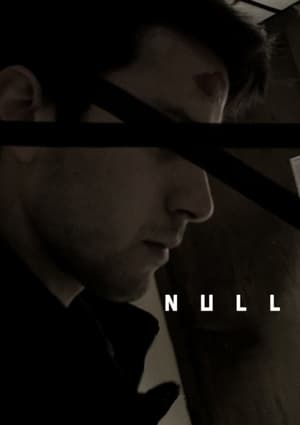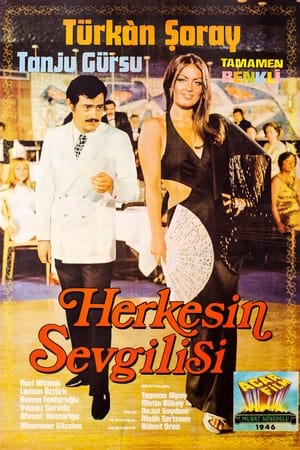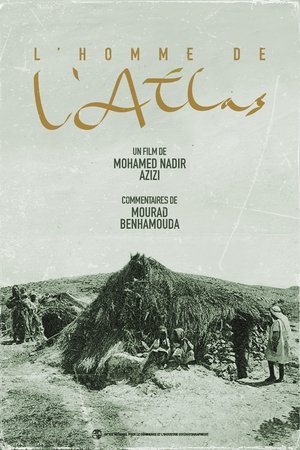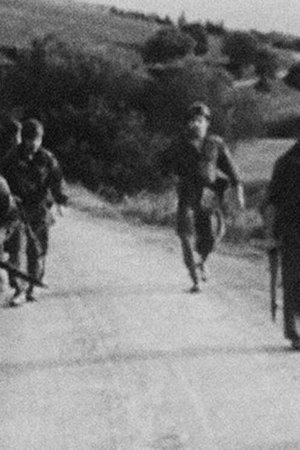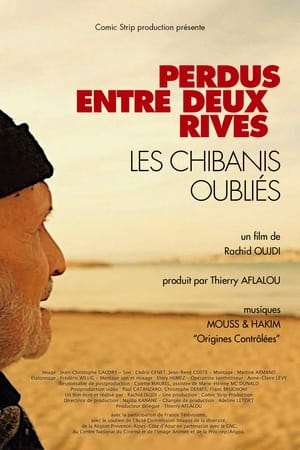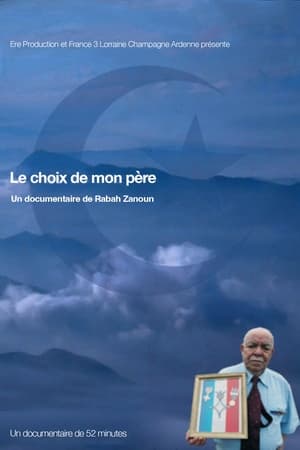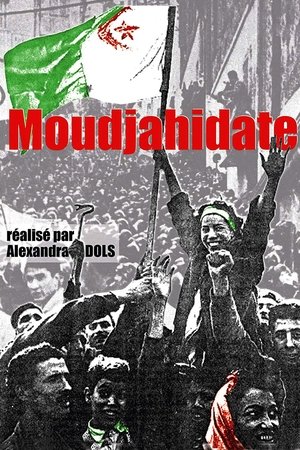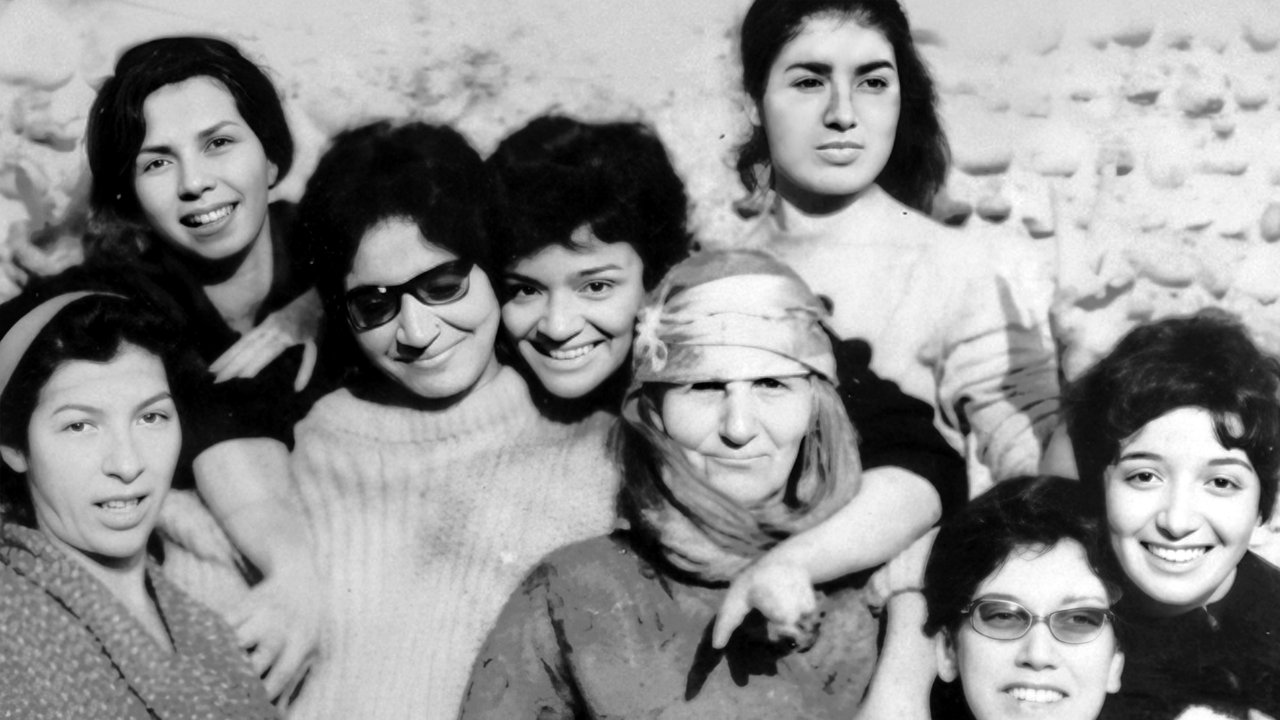
The Words Women Spoke One Day(2024)
1962, at the end of the Algerian War, Algerian independence activists are released from Rennes prison. For one night, filmmaker Yann Le Masson films them. They tell him their vision for the future of Algeria and the place women must occupy in the new society to be built. Fifty years later, with the soundtrack missing, Raphaël Pillosio sets out to find these women. Two deaf people set about lip-reading the women filmed by Yann Le Masson, revealing snatches of sentences, words cut short by the camera's shifts. An investigative film in which the few activists still alive discover their old testimonies and tell us their silent story. The reconstruction of the lost soundtrack will remain in suspense; no happy ending will come to absorb the absence, to cancel the ferocious operation of time. An essay film about cinema that depicts their disappearance, and forever keeps them alive.

Movie: The Words Women Spoke One Day
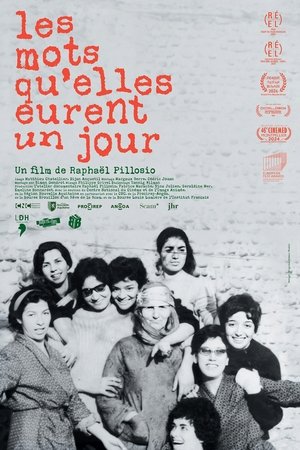
Les Mots Qu'elles Eurent Un Jour
HomePage
Overview
1962, at the end of the Algerian War, Algerian independence activists are released from Rennes prison. For one night, filmmaker Yann Le Masson films them. They tell him their vision for the future of Algeria and the place women must occupy in the new society to be built. Fifty years later, with the soundtrack missing, Raphaël Pillosio sets out to find these women. Two deaf people set about lip-reading the women filmed by Yann Le Masson, revealing snatches of sentences, words cut short by the camera's shifts. An investigative film in which the few activists still alive discover their old testimonies and tell us their silent story. The reconstruction of the lost soundtrack will remain in suspense; no happy ending will come to absorb the absence, to cancel the ferocious operation of time. An essay film about cinema that depicts their disappearance, and forever keeps them alive.
Release Date
2024-03-24
Average
8.5
Rating:
4.3 startsTagline
Genres
Languages:
FrançaisKeywords
Recommendations Movies
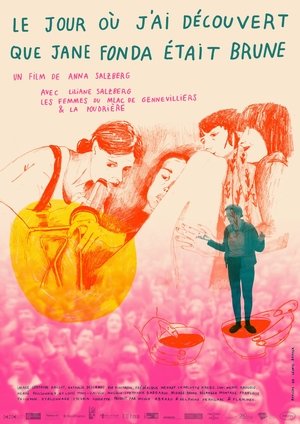 7.5
7.5The Day I Discovered that Jane Fonda Was a Brunette(fr)
“I ask my mother about her past feminist commitment, and why she made a child on her own. She doesn’t answer me. I want to pierce the mystery of my mother. I discover the women’s movement of the 1970s, an activist feminist cinema, and the woman filmmaker that I am changes. I meet and testify to the transmission of a memory of feminist struggles through collective cinematographic practices.” Anna Salzberg
Look, She Has Her Eyes Wide Open(fr)
In March 1977, six activists of the Movement for the Liberation of abortion and contraception (MLAC) were tried for the illegal practice of abortion. Around the trial, the film reveals the lives of this group of women proposing to appropriate medical knowledge associated with childbirth and abortion.
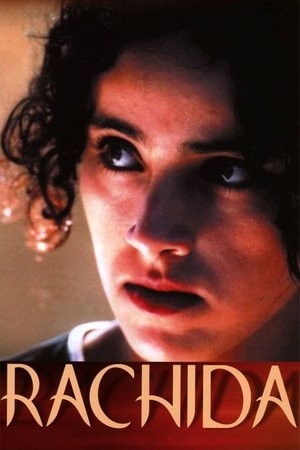 6.9
6.9Rachida(ar)
Rachida, a young and self-assured teacher at an elementary school, becomes the target of terrorists when she refuses to place a bomb in her classroom. This acclaimed debut feature offers a unique glimpse into the lives of ordinary citizens in Algeria, where terrorism was commonplace during the civil conflict of the 1990s.
Captain Nulle(lv)
Valdis Nulle is a young and ambitious captain of fishing ship 'Dzintars'. He has his views on fishing methods but the sea makes its own rules. Kolkhoz authorities are forced to include dubious characters in his crew, for example, former captain Bauze and silent alcoholic Juhans. The young captain lacks experience in working with so many fishermen on board. Unexpectedly, pretty engineer Sabīne is ordered to test a new construction fishing net on Nulle's ship and 'production conflict' between her and the captain arises...
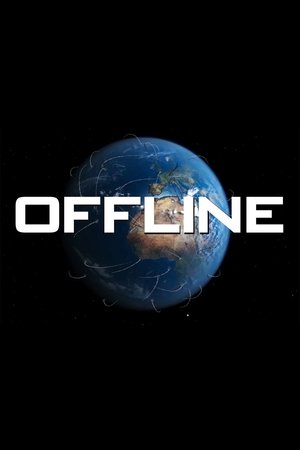 6.0
6.0Offline(en)
Kevin is annoyed that he has to spend his afternoon teaching his Grandma how to use the World Wide Web, so he decides to leave it to herself to learn. However, with only a few instructions left by her Grandson, Grandma accidentally deletes the Internet. While Grandma sits quietly at home with no knowledge of what she has done, chaos and destruction begin to arise as many struggle to come to grips with their current offline status, including an online gamer in France, a pretentious Canadian Internet expert, a high tempered American President trying to find the source of the problem, and many more from around the world.
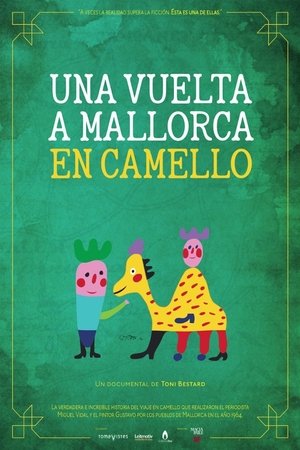 5.0
5.0Una vuelta a Mallorca en camello(en)
The real story about the camel ride around Mallorca, that journalist Miguel Vidal and painter Gustavo Peñalver did in 1964. Sometimes truth is stranger than fiction. This is one of them.
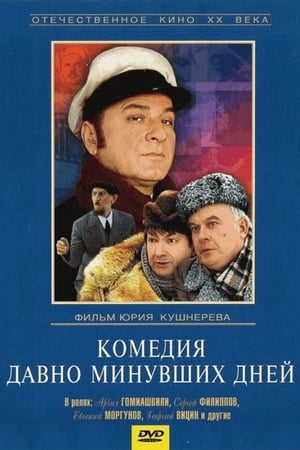 4.0
4.0A Comedy of Days Gone By(ru)
An adventures of the famous movies characters in the movies archive.
 10.0
10.0George Strait: For the Last Time - Live from the Astrodome(en)
George Strait plays the last concert at the Houston Astrodome.
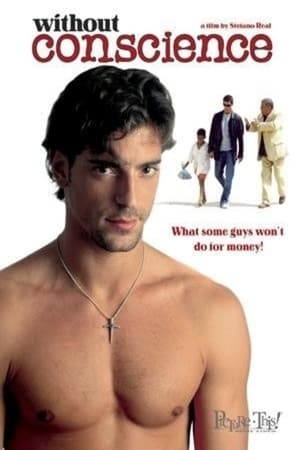 4.0
4.0Without Conscience(it)
Reclusive middle-aged male nurse Mauro may be in over his head when -- to save his hospital job -- he agrees to accompany 10-year-old illegal immigrant Eddi to meet his adoptive parents at the Swiss border. Along for the ride is a laconic small-time mobster named Rollo, and problems soon ensue in the form of car trouble, a Bulgarian hooker and her pimps.
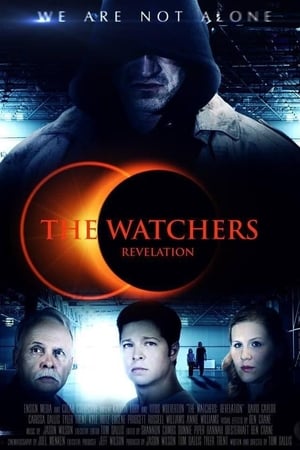 4.3
4.3The Watchers: Revelation(en)
An inexplicable archeological find leads Dr. Peter Kenner to conclude that we are not alone, aliens have visited the Earth in the distant past and have now returned. Struggling to reconcile the evidence with his once held religious views, Peter turns to his uncle, Josh Sanders, a retired scientist and a man of strong Christian faith. Meanwhile, Sarah Pennington seeks protection for her young daughter, Kara, believing the extraterrestrials are bent on abducting the gifted nine-year-old as they did Sarah's husband three years earlier. When the four are brought together by Ethan, a mysterious stranger, Peter and Sarah wrestle with their own beliefs as Josh seeks to convince them of the truth. It becomes clear that Kara has a very special gift-one that can expose the true nature of the extraterrestrials.
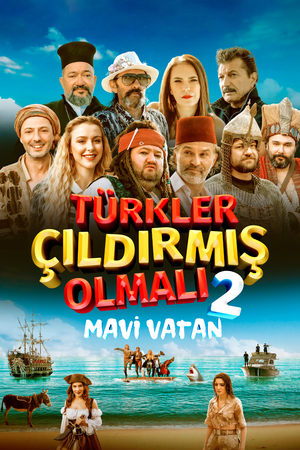 4.7
4.7The Turks Must Be Crazy 2: Blue Homeland(tr)
In Fethiye, the team that organizes crazy island tours for tourists with a pirate ship will try to prevent a war that is about to break out in Turkey. The team members, who are not soldiers by profession, will try to do this in their own way. Unexpected events will occur in the Blue Homeland.
 6.1
6.1UFC 72: Victory(en)
UFC 72: Victory was a mixed martial arts event held by the Ultimate Fighting Championship. The event took place Saturday, June 16, 2007 at The Odyssey in Belfast, Northern Ireland. Martin Kampmann was scheduled to fight Rich Franklin, but was forced to withdraw due to injury. Yushin Okami replaced Kampmann in the main event.
 7.3
7.3The Secret Life of Snakes(en)
This documentary features some of Europe's most stunning species, like the European adder, the nose-horned viper, the dice snake, the ringed snake and the Aesculapian snake.
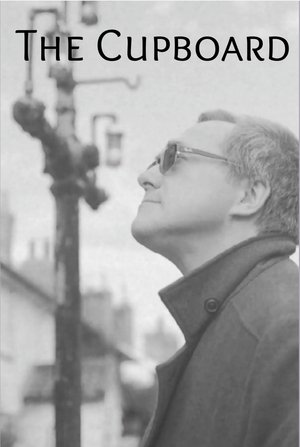 10.0
10.0The Cupboard(en)
A detective enters the home of a suspicious man in search of a person reported missing.
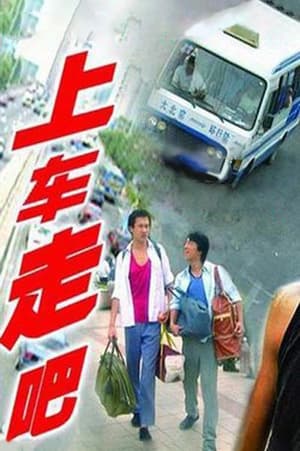 8.3
8.3Mini-bus(zh)
Set in 1998. Two young men, Liu and Gao, come to Beijing from Shandong Province. The cousin who is leaving for Hainan Province entrusts the minibus he contracted to the two men. They run the minibus and compete in the competitive suburban transport market.
Similar Movies
 6.0
6.0A Captain's Honor(fr)
During a televised debate on the Algerian war in the early 1980s, Professor Paulet denounced the methods of Captain Caron, killed in action in 1957. The widow of the captain, Patricia, decided to file a defamation suit.
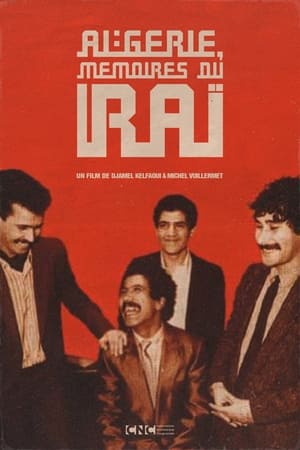 10.0
10.0Algeria, Memoirs of Raï(fr)
In the 1980s, Algeria experienced a tumultuous social context which reached its peak during the riots of October 88. This wave of protest, with youth as its figurehead, echoed the texts of raï singers. Thirst for freedom, misery of life and the aspirations of youth are among the main themes of their works which will inspire an entire generation. More than music, raï celebrates the Arabic language and becomes a vector of Algerian culture, thus providing the cultural weapons of emerging Algerian nationalism With Cheb Khaled, Cheb Mami and Chaba Fadela as leaders of the movement, raï is also a way of telling and reflecting the essence of Algeria in these difficult times. While the threat weighs on artists in Algeria, their exile allows raï to be exported internationally and thus, to bring the colors of Algeria to life throughout the world.
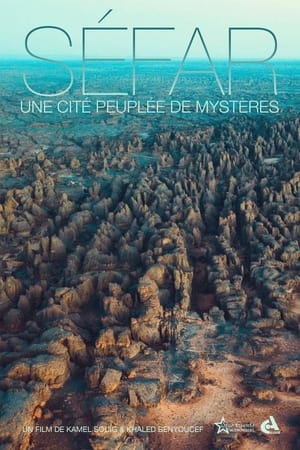 10.0
10.0Séfar, A City of Mysteries(fr)
Séfar (in Arabic: سيفار) is an ancient city in the heart of the Tassili n'Ajjer mountain range in Algeria, more than 2,400 km south of Algiers and very close to the Libyan border. Séfar is the largest troglodyte city in the world, with several thousand fossilized houses. Very few travelers go there given its geographical remoteness and especially because of the difficulties of access to the site. The site is full of several paintings, some of which date back more than 12,000 years, mostly depicting animals and scenes of hunting or daily life which testify that this hostile place has not always been an inhabited desert. Local superstition suggests that the site is inhabited by djins, no doubt in connection with the strange paintings found on the site.
 0.0
0.0Ancient Algiers(ar)
In the heart of the historic Casbah of Algiers, buzzing with life, we follow a day in the life of Mousaab, a passionate Algerian teenager navigating his challenges while his love for his local football club runs deep.
 10.0
10.0Algerian Refugees(fr)
Directed by Pierre Clément and Djamel-Eddine Chanderli, produced by the FLN Information Service in 1958, this film is a rare document. Pierre Clément is considered one of the founders of Algerian cinema. In this film he shows images of Algerian refugee camps in Tunisia and their living conditions. A restored DVD version released in 2016, from the 35 mm original donated by Pierre Clément to the Contemporary International Documentation Library (BDIC).
 6.0
6.0Glimpses of Morocco and Algiers(en)
This FitzPatrick Traveltalk short visits the cities of Casablanca, Rabat, and Marrakesh in Morocco, as well as the city of Algiers in Algeria.
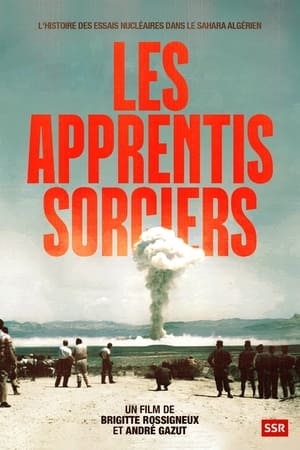 10.0
10.0The Sorcerer's Apprentice(fr)
60 years ago, in the Algerian desert, an atomic bomb, equivalent to three or even four times Hiroshima, exploded. Named the “Blue Gerboise”, it was the first atomic bomb tested by France, and of hitherto unrivaled power. This 70 kiloton plutonium bomb was launched in the early morning, in the Reggane region, in southern Algeria, during the French colonial era. If this test allowed France to become the 4th nuclear power in the world, it had catastrophic repercussions. France had, at the time, certified that the radiation was well below the standard safety threshold. However, in 2013, declassified files revealed that the level of radioactivity had been much higher than announced, and had been recorded from West Africa to the south of Spain.
 10.0
10.0Bouzareah(fr)
Arriving aboard the liner “Ville d’Alger”, young French citizens go to Bouzareah to follow a one-year professional training course at the École Normale. After acquiring the basics of the Arabic language and culture, the future teachers are trained to teach the population the basics of modern agriculture, manual work and hygiene. A study trip concludes the training. The teachers are then sent to the regions of their choice, where they will put their knowledge at the service of the inhabitants.
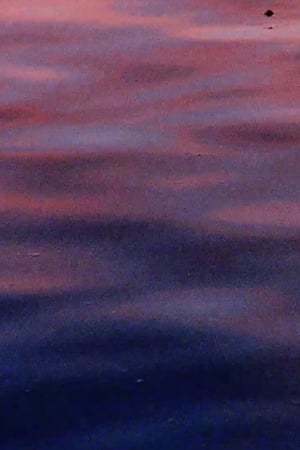 4.0
4.0Color-Blind(fr)
A synaesthetic portrait made between French Polynesia and Brittany, Color-blind follows the restless ghost of Gauguin in excavating the colonial legacy of a post-postcolonial present.
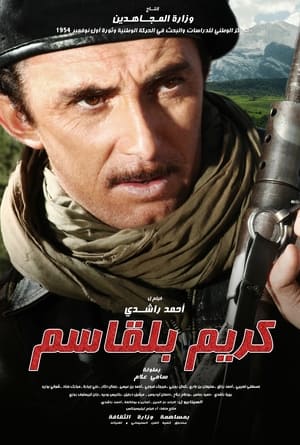 10.0
10.0Krim Belkacem(ar)
This film retraces the combat journey of Krim Belkacem, one of the leading figures of the Algerian War. When he left the Dellys barracks in October 1945, the day after the Second World War, Krim Belkacem was 23 years old. He is a man revolted by the May massacres in Sétif, Guelma, Kherrata and several other localities in the ravaged country. But it is also and above all a young Algerian who questions the future of Algeria. On March 21, 1947, Krim at the age of 25, he dug up his "Sten" submachine gun, he took action against the boss of his douar who was none other than his cousin. He goes into hiding with six companions. He meshes this entire part of Algeria with a dense and dense network with the sole objective of taking action which will lead to the outbreak of the armed struggle on November 1, 1954.
 7.2
7.2Dawn of the Damned(fr)
This excellent feature-length documentary - the story of the imperialist colonization of Africa - is a film about death. Its most shocking sequences derive from the captured French film archives in Algeria containing - unbelievably - masses of French-shot documentary footage of their tortures, massacres and executions of Algerians. The real death of children, passers-by, resistance fighters, one after the other, becomes unbearable. Rather than be blatant propaganda, the film convinces entirely by its visual evidence, constituting an object lesson for revolutionary cinema.
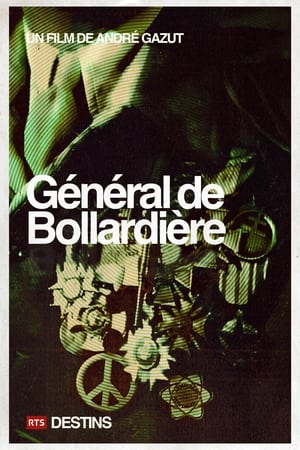 10.0
10.0Destins: Général De Bollardière(fr)
The exceptional portrait of a pacifist general, the only senior officer to have spoken out against torture. This precious testimony still remains censored in France, since no national channel has to date decided to program this documentary. Son and brother of a soldier, General Pâris de Bollardière was destined for a career in arms. He was, for many years, one of the most brilliant representatives of this adventurer career in France, from Narvik to the Algerian War. After fighting in the French maquis, he reached Indochina, where he suddenly found himself in the aggressor's camps. His beliefs are strongly shaken. But it is in Algeria, where the French army practices torture and summary executions, that he takes the big turn. He expresses his contempt to Massu, and is relieved of his command. Until his death in 1986, Jacques de Bollardière fought for world peace, from the Larzac plateaus to the Mururoa atolls.
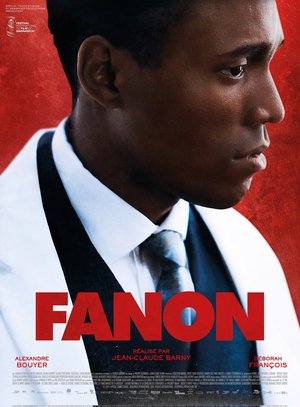 6.5
6.5Fanon(fr)
Frantz Fanon, a French psychiatrist from Martinique, has just been appointed head of department at the psychiatric hospital in Blida, Algeria. His methods contrast with those of the other doctors in a context of colonization. A biopic in the heart of the Algerian war where a fight is waged in the name of Humanity.
 0.0
0.0TOMBOY(en)
TOMBOY explores the obstacles that young girls encounter on the recreational stage, the stereotypes, language issues and cultural disparities that follow, and ultimately the insufficient media coverage and compensation that afflicts elite professional athletes seeking full recognition for their talents. The journey of the female athlete is often discouraging, and despite progress achieved during the Title IX era, gender equity in athletics has a long way to go.
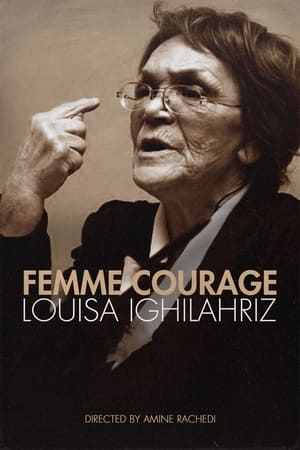 10.0
10.0Woman of Courage - Louisa Ighilahriz(ar)
The autobiographical account of the tormented life of a witness of the century: Louisa Ighilahriz, activist and leading figure in Algerian independence. A student, she joined the independence struggle at the age of 20, joining the ranks of the FLN on the eve of the Battle of Algiers in late 1956 under the name Lila. She took part in the high school students' strike, then fled into the maquis when she was actively sought after. She was part of the French FLN support network of "suitcase carriers" during the Battle of Algiers. Seriously wounded alongside her network leader, Saïd Bakel, during an ambush in 1957, hospitalized and then imprisoned, she suffered numerous tortures in French prisons. She will be saved from certain death by an anonymous person, she will seek, for forty years, to find him just to show him her gratitude... Emblematic of the painful Franco-Algerian history, Louisa's story is poignant and imbued with humanism.
